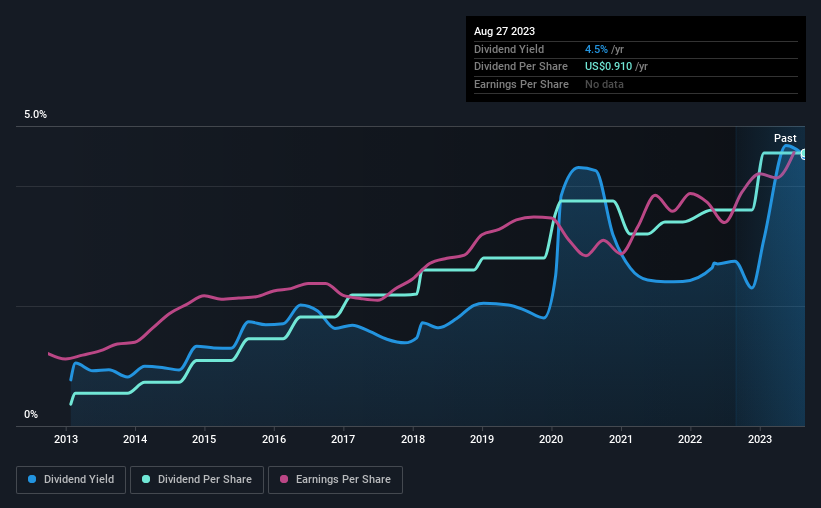Is It Smart To Buy Peoples Bancorp of North Carolina, Inc. (NASDAQ:PEBK) Before It Goes Ex-Dividend?
Some investors rely on dividends for growing their wealth, and if you're one of those dividend sleuths, you might be intrigued to know that Peoples Bancorp of North Carolina, Inc. (NASDAQ:PEBK) is about to go ex-dividend in just 4 days. The ex-dividend date is usually set to be one business day before the record date which is the cut-off date on which you must be present on the company's books as a shareholder in order to receive the dividend. The ex-dividend date is an important date to be aware of as any purchase of the stock made on or after this date might mean a late settlement that doesn't show on the record date. Meaning, you will need to purchase Peoples Bancorp of North Carolina's shares before the 1st of September to receive the dividend, which will be paid on the 15th of September.
The company's next dividend payment will be US$0.19 per share, on the back of last year when the company paid a total of US$0.91 to shareholders. Calculating the last year's worth of payments shows that Peoples Bancorp of North Carolina has a trailing yield of 4.5% on the current share price of $20.2. We love seeing companies pay a dividend, but it's also important to be sure that laying the golden eggs isn't going to kill our golden goose! As a result, readers should always check whether Peoples Bancorp of North Carolina has been able to grow its dividends, or if the dividend might be cut.
View our latest analysis for Peoples Bancorp of North Carolina
Dividends are typically paid out of company income, so if a company pays out more than it earned, its dividend is usually at a higher risk of being cut. Peoples Bancorp of North Carolina paid out just 23% of its profit last year, which we think is conservatively low and leaves plenty of margin for unexpected circumstances.
When a company paid out less in dividends than it earned in profit, this generally suggests its dividend is affordable. The lower the % of its profit that it pays out, the greater the margin of safety for the dividend if the business enters a downturn.
Have Earnings And Dividends Been Growing?
Businesses with strong growth prospects usually make the best dividend payers, because it's easier to grow dividends when earnings per share are improving. If earnings fall far enough, the company could be forced to cut its dividend. Fortunately for readers, Peoples Bancorp of North Carolina's earnings per share have been growing at 13% a year for the past five years.
Another key way to measure a company's dividend prospects is by measuring its historical rate of dividend growth. Peoples Bancorp of North Carolina has delivered an average of 29% per year annual increase in its dividend, based on the past 10 years of dividend payments. It's great to see earnings per share growing rapidly over several years, and dividends per share growing right along with it.
To Sum It Up
Has Peoples Bancorp of North Carolina got what it takes to maintain its dividend payments? Typically, companies that are growing rapidly and paying out a low fraction of earnings are keeping the profits for reinvestment in the business. This strategy can add significant value to shareholders over the long term - as long as it's done without issuing too many new shares. Overall, Peoples Bancorp of North Carolina looks like a promising dividend stock in this analysis, and we think it would be worth investigating further.
With that in mind, a critical part of thorough stock research is being aware of any risks that stock currently faces. Every company has risks, and we've spotted 2 warning signs for Peoples Bancorp of North Carolina you should know about.
A common investing mistake is buying the first interesting stock you see. Here you can find a full list of high-yield dividend stocks.
Have feedback on this article? Concerned about the content? Get in touch with us directly. Alternatively, email editorial-team (at) simplywallst.com.
This article by Simply Wall St is general in nature. We provide commentary based on historical data and analyst forecasts only using an unbiased methodology and our articles are not intended to be financial advice. It does not constitute a recommendation to buy or sell any stock, and does not take account of your objectives, or your financial situation. We aim to bring you long-term focused analysis driven by fundamental data. Note that our analysis may not factor in the latest price-sensitive company announcements or qualitative material. Simply Wall St has no position in any stocks mentioned.

